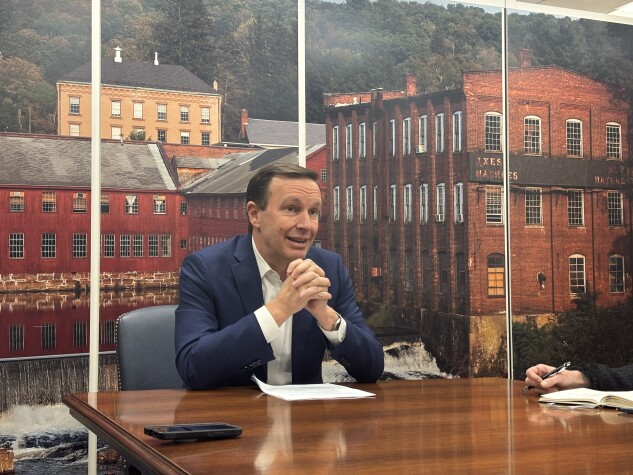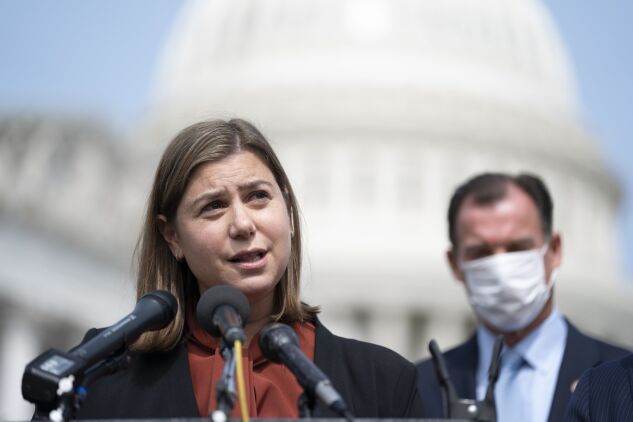Frustration with Democratic leadership in Washington has opened the door to a wave of new voices pushing generational and stylistic shifts — and hoping to reshape their party’s future.
Ambitious senators — often younger, more nimble, and comfortable with risk — are building their own playbooks as the party seeks fresh energy to match a moment when politics moves faster and with fewer constraints.
“There’s a lot of younger leaders that are stepping up right now,” Sen. Chris Murphy (D-Conn.), among the most prominent rising Democratic voices, told Bloomberg Government during a meeting Wednesday.
“I’m not waiting for anyone to give me instructions,” Sen. Andy Kim (D-N.J.) said separately. “I’m already testing out my own messaging, my own sense of how to talk about this moment.”
Other senators drawing attention include freshmen who won battleground states, such as Elissa Slotkin (D-Mich.) and Ruben Gallego (D-Ariz.); senators fluent in new and social media, such as Murphy and Brian Schatz (D-Hawaii); and some willing to defy the party establishment, including Kim and John Fetterman (D-Pa.).
“People want something to hold onto right now and see that people are fighting for them,” even if congressional Democrats have limited formal power, said Joe Calvello, a party strategist and former Senate aide. “This is an opportunity for back-bench people to make a name.”
That means delivering an authentic vision, and a “strong and relentless message that just hits and hits and hits.”
As progressive strategist Anat Shenker-Osorio put it: “If you want to touch a nerve, then you have to touch a nerve.”
While Democrats in both the House and Senate are testing their approaches, each trying to capture voters’ attention, the search for new faces is most acute among Senate Democrats. Top leaders, Senate Minority Leader Chuck Schumer (D-N.Y.) and Minority Whip Dick Durbin (D-Ill.), are 74 and 80, respectively, and were criticized for being caught flat-footed in last week’s government funding fight, sacrificing one of their few chances to influence policy in a Republican-controlled Congress.
“Clearly the country thinks of us as condescending, overeducated scolds,” said Sean Coit, a Democratic strategist and former Senate aide. “So don’t be that.”
As younger Democrats aim to help steer their party, here are some of the Senate voices rising up:
Bernie Sanders (Vt.): Sanders, 83, isn’t young, new, or officially a Democrat. But he’s risen back into the national spotlight in recent weeks alongside Rep. Alexandria Ocasio-Cortez (D-N.Y.) as they’ve drawn crowds of thousands at recent tour stops. Sanders has assets few outside of President Donald Trump can match: a fervent following and an ability to steer conversation with eye-catching ideas. He makes clear what he’s fighting for, who he’s against, and that he’s willing to break stuff if necessary.
“Bernie is as big a phenomenon right now as he’s ever been,” Murphy said.
Chris Murphy (Conn.): Murphy, 51, has been full-go since Trump took office. While many Democrats struggled with how to approach the president’s second term, he quickly called the administration a threat to democracy, getting ahead of the combative stance many colleagues eventually adopted.
“This is not an ordinary moment,” Murphy said during the Bloomberg Government event. “We might be months away from losing our democracy.”
Prolific on TV and social media, he’s seen as a potential future Senate leader, or possibly presidential candidate.
Brian Schatz (Hawaii): The 52-year-old Hawaiian is also widely seen as a contender to fill a leadership role when it comes open. At ease outside the typical political channels, party insiders say he also comfortably moves among both pragmatic and progressive voices. “It’s important to get off the internet and actually talk to humans,” Schatz said this week after a recess.
One sign of ambition was his vote last week to avert a government shutdown, even though it was unpopular with the party base. It showed a senator “serious about governing,” Colt said.
Elissa Slotkin (Mich.): Slotkin won last year even as the Midwestern Blue Wall crumbled for Kamala Harris. Slotkin told reporters Democrats need to focus on “kitchen table” issues and talk about them “plainly, not from the faculty lounge.”
The pragmatic approach was reflected in her official response to Trump’s national address this month. That Democratic leaders chose the 48-year-old freshman for the party’s nationally televised answer shows how she’s viewed.
Ruben Gallego (Ariz.): Like Slotkin, Gallego won a key battleground even as the national ticket faltered. The Latino senator, 45, and military veteran represents a fast-growing demographic that has drifted away from Democrats. He localized his race to argue that Trump’s plans would undercut economic progress in Arizona, and emphasized outreach through events like rodeos and lowrider shows, trying to meet voters on their terms.
Andy Kim (N.J.): Kim sparked a grassroots wave last year to defy New Jersey’s most powerful Democratic insiders and win a senate seat over the governor’s wife. In doing so, he showed a willingness to take risks and break from typical politics.
Before that, Kim, 42, flipped a competitive House seat that included conservative pockets, so he’s comfortable talking to skeptical audiences — as he showed with a trio of town halls last week. Kim now hopes to turn ground-level energy into pushback against Trump, “not just from the legislative standpoint, but from an organizing standpoint.”
Amy Klobuchar (Minn.): As a former presidential candidate, Klobuchar, 64, is part of the existing leadership and exudes sensible, Midwestern vibes. She has consistently won in a state that includes large swaths of the blue-collar communities that have abandoned Democrats. Her presidential run also showed a sneakily funny side — a trait few politicians can claim.
Cory Booker (N.J.): Another member of Senate Democratic leadership and former presidential hopeful, Booker, 55, is skilled on social media and boasts a measure of star power. He’s a powerful orator, but his brand of uplift and togetherness has at times been out of step with a combative political moment.
John Fetterman (Pa.): The brash senator, 55, has a talent for drawing attention in a fractured media landscape. He’s also won multiple times in the country’s largest swing state. But he’s often a lone wolf, breaking from his party. Still, his contrary approach means that for many he doesn’t come across like a typical politician.
Raphael Warnock (Ga.): The pastor of Martin Luther King Jr.’s former church has won a key swing state and carries moral authority. He pointed to his activist background this week when about how to match this moment. Democrats “want us to fight. They want us to push back,” Warnock, 55, told Bloomberg Government. “And that’s exactly what I’m doing.”
To contact the reporter on this story:
To contact the editors responsible for this story:



